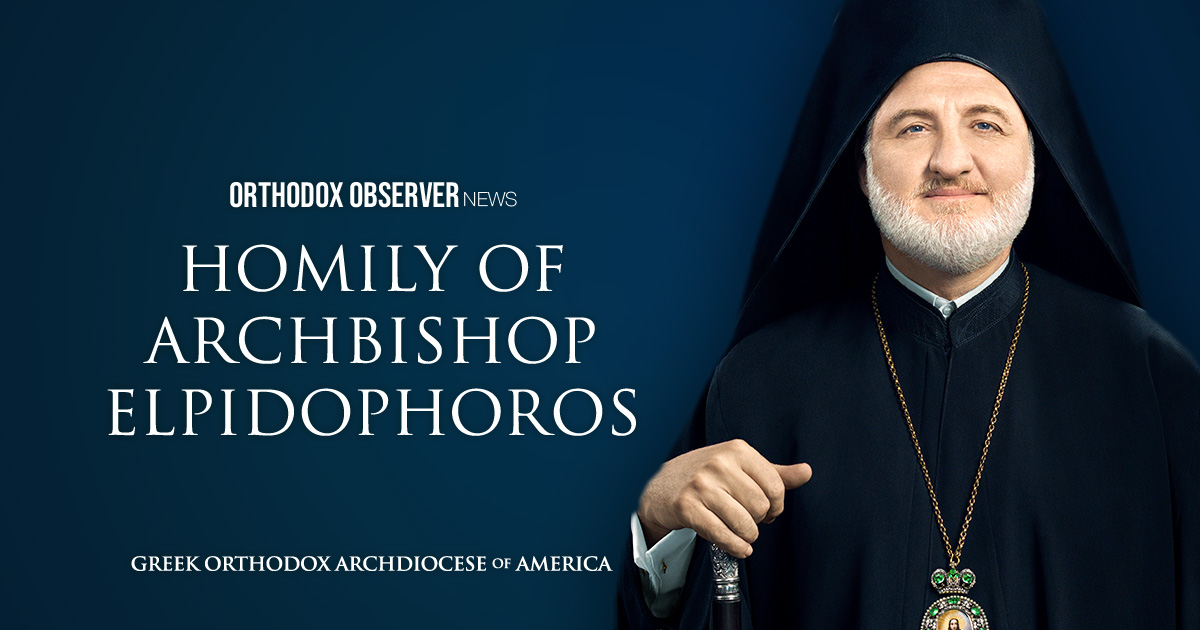His Eminence Archbishop Elpidophoros of America Homily on the Eighth Sunday of Saint Luke
November 15, 2020
Ascension Greek Orthodox Cathedral
Oakland, California
Beloved Brothers and Sisters in Christ,
On this Sunday of the Good Samaritan, I rejoice to be with all of you in this historic community. My visit to Oakland coincides with the ordination to the episcopacy of one most distinguished clergy of your Metropolis, Father Spencer Kezios – now Bishop Spyridon of Amastris. Yesterday in Belmont, at the Parish of the Holy Cross, we celebrated his elevation into the ministry of the High Priesthood of our Lord Jesus Christ. Today, I feel blessed to celebrate the Divine Liturgy with all of you.
This Sunday is particularly important, because it is the inaugural National Philoptochos Sunday, in recognition of their decades of good works that support, nourish, and enrich our Parishes, Metropolises, and the whole body of the Archdiocese. I want to congratulate the Philoptochos of the Ascension Church on this day, and draw attention to their works of charity and benevolence. Indeed, I cannot imagine our Churches in America without the Philoptochos Societies, who are the limbs of the Church’s mercy.
This Sunday of the Samaritan – he is never referred to a “good” in the Gospel, but it has become custom – this Sunday was selected for the National Philoptochos because it reflects their mission so exquisitely.
Think of the Gospel that we read just a little while ago. The Samaritan – who is an outcast to the Jewish Community – comes upon the man left for dead, after others had passed by. The Samaritan does not ask the man’s name or status. He does not judge how this traveler fell in among outlaws. He neither condemns him for his foolishness, or avoids the confrontation with his tragic circumstances.
What he does feel is compassion – compassion for the obvious suffering and misery into which his life had descended. This is the standard for us. And this is the example of Philoptochos.
When we encounter those less fortunate than ourselves, even those whose lives have become full-blown catastrophes, we are called to show them mercy, just as the lawyer answered the Lord’s question:
“Which of the these three seems to you to have been a neighbor to the man who fell among the outlaws?” And the lawyer answered, “The one who showed him mercy.” [*]
And the Lord’s follow-up? His command? Πορεύου καὶ σὺ ποίει ὁμοίως. “Go forth and do likewise.” [†] This is the mission of the Philoptochos as well, that we should all do likewise, ands show mercy without reservation.
My beloved Christians,
The Philoptochos members are the vanguard of the Church in the spiritual war for compassion, but we are all called to show this kind of mercy. Without judgment, without blame, without prejudice.
And remember, my friends, this is not so easy. The Samaritan was the least likely person to come to the rescue of this stranger. What could he have been thinking? Was he worried that the outlaws would come back? Was he anxious that he would be blamed for the man’s sorry condition? Was he concerned that he would end up being responsible for the man’s health thereafter?
He was, not only, not worried, he was eager to wash and bind up the man’s wounds, to place him on his own beast of burden, and taking him to the hospice, to expend his own money to ensure the man’s care. And all of these actions without any knowledge of the man as a person. He did not consider his worthiness. He just saw the suffering and his heart opened.
This is our calling as well.
My dear sisters and brothers in Christ,
Let us follow the example of our Philoptochos Societies from coast to coast. Let us follow this Good Samaritan – an icon of the Lord Himself, and not pass by those moments when our compassion can change someone’s life.
Let us go forth, and do likewise.
Amen.

